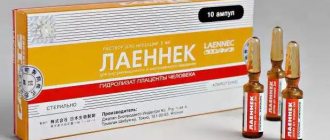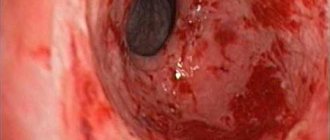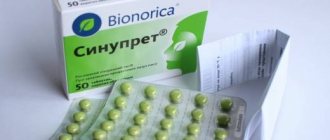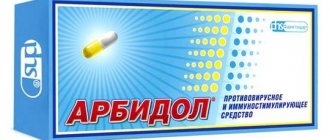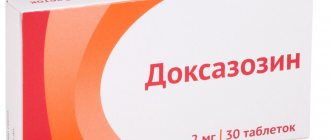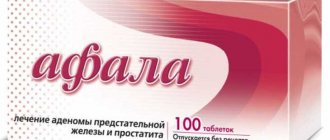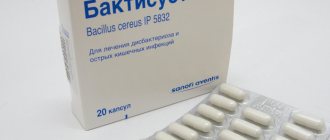- December 8, 2019
- Neurology
- Fedor Bunin
Angioprotectors are widely used in modern medicine. Most often they are prescribed to patients with heart disease and cerebrovascular disorders. Angioprotectors with herbal composition are especially popular. Ginkum is one of the effective representatives of the subgroup.
Release form and composition
The manufacturer supplies the herbal remedy “Ginkoum” 40 mg to pharmacy chains as gelatin capsules with a light brown tint. Inside is a powder form of the active substance, also predominantly coffee or yellowish in color.
- Based on the instructions included with each package, it follows that the active substance of the Ginkum medication is a dry extract of Ginkgo biloba with a content of flavonoid glycosides of 22–27%, as well as terpene lactones of 5–12%. It is inherent in activating the activity of cerebral vessels, eliminating venous congestion, and providing an antioxidant effect.
- Microcrystalline cellulose and calcium stearate, colloidal silicon dioxide are auxiliary components whose task is to maintain and enhance the pharmacological effect of the drug on human brain structures.
Packaging of the medicine in cell protective blisters of 15 pcs. There are from 1 to 4 blisters in a pharmacy pack. Or packaging in polymer pharmaceutical jars of 30 pcs. either 60 pcs., or 90 pcs. There is 1 bottle in a consumer pack.
Pharmacological effect
Ginkoum is a herbal preparation that helps improve microcirculation. It contains dry standardized extract of Ginkgo biloba leaves.
The drug improves the rheological properties of blood, normalizes a number of metabolic processes in cells, and affects the vasomotor reactions of large blood vessels. It improves cerebral and peripheral blood circulation, increases the supply of glucose and oxygen to the brain, and also slightly reduces platelet aggregation and has some vasodilating effect. Ginkoum has an antihypoxic effect, improves the condition of tissues under hypoxic conditions, normalizes metabolic processes and has a pronounced antioxidant effect.
When taking the drug, there is a decrease in swelling of the brain tissue and peripheral tissues. In pathological conditions, Ginkoum prevents an increase in the proteolytic activity of serum.
Ginkgoum
Name:
Ginkgoum
pharmachologic effect
Ginkoum is a herbal preparation that helps improve microcirculation. Ginkgo contains a dry standardized extract of Ginkgo biloba leaves. The drug improves the rheological properties of blood, normalizes a number of metabolic processes in cells, and affects the vasomotor reactions of large blood vessels.
Ginkoum improves cerebral and peripheral blood circulation, increases the supply of glucose and oxygen to the brain, and also somewhat reduces platelet aggregation and has some vasodilating effects.
Ginkoum has an antihypoxic effect, improves the condition of tissues under hypoxic conditions, normalizes metabolic processes and has a pronounced antioxidant effect. When taking the medicine Ginkoum, there is a decrease in swelling of the tissues of the brain and peripheral tissues.
In pathological conditions, Ginkoum prevents an increase in the proteolytic activity of serum.
The pharmacokinetics of the drug Ginkoum has not been studied.
Mode of application
Ginkoum capsules are intended for oral use. The drug can be used regardless of food intake. It is not recommended to crush or chew the capsules before taking. The duration of the course of therapy and dosage of the Ginkum medication is determined by the doctor depending on the nature of the disease and the general condition of the patient.
For the symptomatic treatment of cerebral circulatory disorders, 1-2 capsules of Ginkum (40-80 mg of dry standardized extract of Ginkgo biloba) three times a day are generally prescribed. The course of therapy is often long and lasts at least 8 weeks.
For peripheral circulatory disorders, it is generally prescribed to take 1 capsule of Ginkum (40 mg dry standardized extract of Ginkgo biloba) three times a day or 2 capsules of Ginkum (80 mg dry standardized extract of Ginkgo biloba) twice a day.
The recommended duration of treatment is at least 6 weeks.
For vascular and involutional pathologies of the inner ear, it is generally prescribed to take 1 capsule of Ginkum (40 mg dry standardized extract of Ginkgo biloba) three times a day or 2 capsules of Ginkum (80 mg dry standardized extract of Ginkgo biloba) twice a day.
If you miss a regular dosage of Ginkoum, take the next one at the usual time, without increasing the dose.
Side effects
Ginkoum is generally well tolerated by patients. Most undesirable effects are often mild and do not require discontinuation of the drug or specific therapy.
When taking the drug Ginkoum, patients are likely to develop dyspepsia, headache, hearing impairment and blood clotting, as well as dizziness and systemic allergic reactions (including urticaria, itching and swelling of the skin).
If undesirable effects develop, including those not described in the annotation, you should consult a doctor. In case of sudden deterioration in hearing, up to complete loss of hearing, you should stop taking Ginkum and consult a doctor as soon as possible.
In addition, consultation with a doctor is necessary if you experience frequent tinnitus and dizziness while taking Ginkum.
Pregnancy
During pregnancy, the use of the drug Ginkoum is not advisable due to the lack of convincing data on the effect of the drug on the fetus and the course of pregnancy. During lactation, the drug Ginkoum is not used (if avoiding the use of the drug Ginkoum is prohibited, the issue of stopping breastfeeding must be resolved).
Interaction with other drugs
There is a possibility of interaction between the drug Ginkoum and drugs that have an anticoagulant effect.
Release form
Ginkoum capsules, 15 pieces in blister packs, in a cardboard pack of 1, 2, 3 or 4 blister packs. Ginkoum capsules, 30 or 60 pieces in jars made of polymer materials, 1 jar included in a cardboard pack.
Storage conditions for the drug Ginkoum
The drug Ginkum should be stored and transported in its original packaging at a temperature range of 15 to 25 degrees Celsius. If storage recommendations are followed, Ginkoum is valid for 3 years after release.
Synonyms
Ginkgo Biloba, Tanakan, Bilobil, Memoplant.
Compound
1 capsule of Ginkum contains: Dry extract of Ginkgo biloba leaves (including rutin - 24% and terpene lactones - 5%) - 40 mg;
Additional ingredients.
Source: https://medprep.info/drug/medicament/ginkoum
Indications for use
What does it help with? If we take the instructions from Ginkoum, we will read (on the official website) that the remedy is indicated:
- For cerebrovascular accidents (it is not specified whether this means strokes, that is, acute deterioration, or chronic conditions). This is very important for neurologists.
- Vestibular disorders. It claims to be able to treat dizziness, tinnitus, and unsteady gait, which is a symptom of vestibular disorder.
- For peripheral circulatory disorders. The manufacturer considers various symptoms to be indications for use, such as heaviness and cramps in the legs, decreased sensitivity, paresthesia, and pain when walking. For peripheral circulatory disorders.
Of course, these readings are the required minimum. But doctors, “committed” to prescribing this drug, when they consider it necessary, significantly expand the spectrum. Many patients may be prescribed it for a variety of reasons, and it takes a long time to buy and take it. With the help of Ginkoum, “memory” and forgetfulness, absent-mindedness and vascular diseases are treated, but, alas, they are not cured. Unfortunately, ) did not bother to indicate that it is advisable to use Ginkoum as part of complex therapy, then it may help better. And so it seems that these tablets can be used as monotherapy for strokes.
Ginkum
Ginkoum is a herbal remedy.
This drug normalizes cellular metabolism in the brain, improves blood circulation in tissues and actively supplies them with an additional dose of oxygen.
This product is based on an extract of the leaves of the ginkgo tree, which in China, Japan and Korea is considered a symbol of longevity.
Due to this component, memory improves, consciousness becomes clear, and the process of physiological aging slows down.
On this page you will find all the information about Ginkoum: complete instructions for use for this drug, average prices in pharmacies, complete and incomplete analogues of the drug, as well as reviews of people who have already used Ginkoum. Would you like to leave your opinion? Please write in the comments.
Clinical and pharmacological group
Herbal medicine.
The action is due to the nature of its influence on metabolic processes in cells, the rheological properties of blood and microcirculation, as well as on the vasomotor reactions of large blood vessels.
Prices
How much does Ginkum cost? The average price in pharmacies is 300 rubles.
Release form and composition
The manufacturer supplies the herbal remedy “Ginkoum” 40 mg to pharmacy chains as gelatin capsules with a light brown tint. Inside is a powder form of the active substance, also predominantly coffee or yellowish in color.
- Based on the instructions included with each package, it follows that the active substance of the Ginkum medication is a dry extract of Ginkgo biloba with a content of flavonoid glycosides of 22–27%, as well as terpene lactones of 5–12%. It is inherent in activating the activity of cerebral vessels, eliminating venous congestion, and providing an antioxidant effect.
- Microcrystalline cellulose and calcium stearate, colloidal silicon dioxide are auxiliary components whose task is to maintain and enhance the pharmacological effect of the drug on human brain structures.
Packaging of the medicine in cell protective blisters of 15 pcs. There are from 1 to 4 blisters in a pharmacy pack. Or packaging in polymer pharmaceutical jars of 30 pcs. either 60 pcs., or 90 pcs. There is 1 bottle in a consumer pack.
Pharmacological effect
Ginkoum is a herbal preparation that helps improve microcirculation. It contains dry standardized extract of Ginkgo biloba leaves.
The drug improves the rheological properties of blood, normalizes a number of metabolic processes in cells, and affects the vasomotor reactions of large blood vessels.
It improves cerebral and peripheral blood circulation, increases the supply of glucose and oxygen to the brain, and also slightly reduces platelet aggregation and has some vasodilating effect.
Ginkoum has an antihypoxic effect, improves the condition of tissues under hypoxic conditions, normalizes metabolic processes and has a pronounced antioxidant effect.
When taking the drug, there is a decrease in swelling of the brain tissue and peripheral tissues. In pathological conditions, Ginkoum prevents an increase in the proteolytic activity of serum.
Indications for use
What does it help with? If we take the instructions from Ginkoum, we will read (on the official website) that the remedy is indicated:
- For cerebrovascular accidents (it is not specified whether this means strokes, that is, acute deterioration, or chronic conditions). This is very important for neurologists.
- Vestibular disorders. It claims to be able to treat dizziness, tinnitus, and unsteady gait, which is a symptom of vestibular disorder.
- For peripheral circulatory disorders. The manufacturer considers various symptoms to be indications for use, such as heaviness and cramps in the legs, decreased sensitivity, paresthesia, and pain when walking. For peripheral circulatory disorders.
Of course, these readings are the required minimum. But doctors, “committed” to prescribing this drug, when they consider it necessary, significantly expand the spectrum. Many patients may be prescribed it for a variety of reasons, and it takes a long time to buy and take it.
With the help of Ginkoum, “memory” and forgetfulness, absent-mindedness and vascular diseases are treated, but, alas, they are not cured. Unfortunately, ) did not bother to indicate that it is advisable to use Ginkoum as part of complex therapy, then it may help better.
And so it seems that these tablets can be used as monotherapy for strokes.
Contraindications
There are also a number of prohibitions, in the presence of which Ginkoum use will be unjustified and even dangerous to health, they are presented:
- Circulatory disorders in the brain of the acute stage;
- Any trimester of pregnancy and the period of natural feeding of the child, since studies have not been conducted to identify the negative effects of the drug on the fetus and infant;
- Problems with blood clotting function;
- The stage of exacerbation of a pathology such as a stomach or duodenal ulcer;
- Gastritis with open erosions;
- Children under 12 years of age, because clinical observations of a group of patients in this category were not carried out.
If there are one or more contraindications, the use of the product is prohibited, or treatment must be prescribed by a doctor and carried out under his strict supervision.
Instructions for use
The instructions for use indicate that Ginkoum capsules are taken orally, regardless of the time of meal, swallowed whole and washed down with a sufficient amount of liquid.
Recommended dosage regimen in the absence of other doctor's prescriptions:
- Peripheral circulatory disorders: daily dose – 160 mg of standardized dry extract of Ginkgo biloba, 1 capsule of 80 mg or 2 capsules of 40 mg 2 times a day, therapeutic course – at least 6 weeks.
- Vascular or involutional pathology of the inner ear: daily dose - 160 mg of standardized dry extract of Ginkgo biloba, 1 capsule of 80 mg or 2 capsules of 40 mg 2 times a day, therapeutic course - 6-8 weeks.
- Cerebrovascular disorder (symptomatic therapy): daily dose – 160–240 mg of standardized dry extract of Ginkgo biloba, 1 capsule 80 mg or 2 capsules 40 mg 2–3 times a day, therapeutic course – at least 8 weeks; After 3 months from the start of taking the drug, the doctor must decide on the need for further treatment.
If you miss the next dose of the drug or take an insufficient amount, the subsequent dose is taken as prescribed without any changes.
Side effects
Naturally, they exist, like almost all dietary supplements. Ginkum was no exception (instructions for use, reviews from consumers and doctors will be below).
The first thing the manufacturer lists as a side effect is allergic reactions.
And this is not surprising, because almost all preparations containing herbal ingredients can cause itching and irritation. The second thing the manufacturer pays attention to is headaches.
It’s very strange, considering that in theory the supplement is intended to reduce them. And the third is dizziness and tinnitus.
Most often, according to studies, this occurs due to prolonged use of the drug or excessive intellectual stress. It is possible that memory from the supplement improves, but you should still treat it with extreme caution and attentiveness.
Overdose
At the moment, not a single case of overdose has been reported when using the drug Ginkoum.
special instructions
The use of ginkgo biloba preparations should be avoided in the presence of risk factors for the development of intracranial hemorrhage.
Drug interactions
There are reports that when using ginkgo biloba preparations and simultaneous thrombolytic therapy (taking anticoagulants, antiplatelet agents, including acetylsalicylic acid), the risk of developing cerebral hemorrhage increases.
Reviews
We have selected some people's reviews about the drug Ginkoum:
- Nastya. I had problems with the blood vessels of the brain. And in order not to bring the situation to a deplorable state, the doctor advised me to take a course of the drug Ginkum. And indeed, after two weeks I began to feel much better. I recommend to everyone!
- Angelina. The drug is excellent, it was prescribed to my mother, after I saw a good effect (she became more intelligent, attentive, collected, her overall health improved), I decided to take it myself and the effect was the same. Therefore, I advise everyone, it really has a positive effect on the nervous system.
- Alexander. Due to the constant stress of my professional life, I began to feel dizzy at the end of the day and muscle weakness throughout my body. I started reading on the Internet how you can help yourself in such a situation and discovered the drug Ginkoum. I read all the reviews about it, became familiar with the possible side effects and decided to undergo a course of treatment. After just a few days of use, general health stabilized, dizziness disappeared, and memory improved.
Analogs
Full synonyms of the drug are few. Today, pharmacists can offer only one product, the active component of which is also gingo biloba extract. This is Gingo Biloba.
- There are synthetic analogues of dietary supplements. These are tablet drugs “Vinpocetine”, “Cavinton”, “Glycine” and others, as well as injection solutions – “Cerebrolysate”, “Nootropil”, “Piracetam Vial”.
Before using analogues, consult your doctor.
Storage conditions and shelf life
The shelf life of the drug is 2 years from the date of production. The drug should be stored out of the reach of children, avoiding direct sunlight on the blisters at a temperature of no more than 25 degrees.
After the expiration date, the medicine must be disposed of.
Source: https://simptomy-lechenie.net/ginkoum/
Contraindications
There are also a number of prohibitions, in the presence of which Ginkoum use will be unjustified and even dangerous to health, they are presented:
- Circulatory disorders in the brain of the acute stage;
- Any trimester of pregnancy and the period of natural feeding of the child, since studies have not been conducted to identify the negative effects of the drug on the fetus and infant;
- Problems with blood clotting function;
- The stage of exacerbation of a pathology such as a stomach or duodenal ulcer;
- Gastritis with open erosions;
- Children under 12 years of age, because clinical observations of a group of patients in this category were not carried out.
If there are one or more contraindications, the use of the product is prohibited, or treatment must be prescribed by a doctor and carried out under his strict supervision.
Main advantages of the drug
Buyers in real reviews and experts include primarily:
- low cost compared to foreign, including French, analogues;
- produced in Russia, developed in our country;
- convenient release form;
- no cases of overdose have been recorded;
- no serious side effects;
- shelf life 3 years;
- Sold without a prescription.
There are contraindications. Before use, it is advisable to consult your doctor.
Instructions for use
The instructions for use indicate that Ginkoum capsules are taken orally, regardless of the time of meal, swallowed whole and washed down with a sufficient amount of liquid.
Recommended dosage regimen in the absence of other doctor's prescriptions:
- Peripheral circulatory disorders: daily dose – 160 mg of standardized dry extract of Ginkgo biloba, 1 capsule of 80 mg or 2 capsules of 40 mg 2 times a day, therapeutic course – at least 6 weeks.
- Vascular or involutional pathology of the inner ear: daily dose - 160 mg of standardized dry extract of Ginkgo biloba, 1 capsule of 80 mg or 2 capsules of 40 mg 2 times a day, therapeutic course - 6-8 weeks.
- Cerebrovascular disorder (symptomatic therapy): daily dose – 160–240 mg of standardized dry extract of Ginkgo biloba, 1 capsule 80 mg or 2 capsules 40 mg 2–3 times a day, therapeutic course – at least 8 weeks; After 3 months from the start of taking the drug, the doctor must decide on the need for further treatment.
If you miss the next dose of the drug or take an insufficient amount, the subsequent dose is taken as prescribed without any changes.
Indications of the active substances of the drug Ginkoum
The main constituent substances include:
- ginkgo biloba leaf extract;
- routine;
- terpene lactones.
There are no chemical or narcotic elements in the formula.
A product of plant origin acts on metabolic processes in brain tissue, vasomotor reactions of blood vessels, and prevents platelet aggregation.
The drug inhibits lipid oxidation and the appearance of free radicals in cell membranes.
Each capsule contains 40 mg of extract
ginkgo biloba
.
The leaves of this plant have antiviral, antihistamine, antitoxic, decongestant and neuroprotective effects.
The use of the extract helps normalize blood pressure, eliminate depression and reduce cholesterol in the body.
As a result, metabolism inside cells improves and vascular walls are strengthened.
The main indications for use are cerebrovascular disorders.
These include:
- noise in ears;
- thinking disorder;
- poor sleep;
- general malaise;
- anxiety;
- a feeling of uncertainty in determining the position of the body in space.
The contents of the capsules are well absorbed by the body and do not affect appetite.
On the contrary, dietary supplements promote natural weight loss due to the following reasons:
- the drug eliminates fluid stagnation and relieves swelling;
- anxiety and stress decrease, the need for food returns to normal;
- improved brain function allows you to burn more calories;
- good health predisposes you to exercise.
Despite this reaction of the body, it is wrong to use Ginkoum specifically for weight loss. It is aimed at preserving solid memory and maintaining high vitality.
In addition to indications, the supplement also has contraindications:
- peptic ulcer;
- blood fluid clotting disorder;
- erosive gastritis;
- stroke;
- individual intolerance;
- heart attack
It is prohibited to take dietary supplements during lactation and pregnancy.
Age limit – up to 18 years.
Ginkum suits me 100%. I take it in courses 1-2 times a year when I have headaches. Only this drug helps. In addition, memory and attentiveness become better. This is a useful tool when you need to turn your brain on fully.
My sister takes medicine before the session and exams. He says information is absorbed better, and anxiety and sleep disturbances disappear.
After the birth of my second child, I started having memory problems. I constantly forgot everything. The pharmacy recommended me the dietary supplement Ginkoum.
The small capsules are fairly easy to swallow. The instructions contain all the necessary information.
According to the manufacturer, the product improves cerebral circulation and helps supply the brain with glucose and oxygen. There really is an effect from taking it, but I expected more from the dietary supplement. I will not take the course again.
I have always been skeptical about such dietary supplements. Six months ago, a friend recommended Ginkoum from Evalar. I became interested because I was periodically bothered by cramps and dizziness.
I was attracted by the presence of the Ginkgo Biloba plant in the composition. I read on the Internet that its extract enriches the brain with oxygen and improves blood flow.
I took 2 capsules with food for 8 weeks. I didn't have any side effects. My general condition improved and my sleep became stronger. In general, I recommend it to everyone. This is the best of these drugs in terms of price-quality ratio. In addition, it is available in almost any pharmacy.
Indications for use of the drug
- disorders of brain function, including age-related ones, associated with cerebrovascular accidents, accompanied by attention disorders, memory impairment, decreased intellectual abilities, dizziness, tinnitus, headache;
- disorders of peripheral circulation and microcirculation, accompanied by a feeling of coldness in the extremities, pain when walking, painful cramps and heaviness in the legs, paresthesia;
- dysfunction of the inner ear, manifested by dizziness, unsteady gait and tinnitus.
Contraindications to the use of the drug
are: hypersensitivity to the components of the drug, decreased blood clotting, erosive gastritis, peptic ulcer of the stomach and duodenum in the acute stage, acute cerebrovascular accidents, acute myocardial infarction; children under 18 years of age (due to the lack of sufficient clinical data).
Side effects
Naturally, they exist, like almost all dietary supplements. Ginkum was no exception (instructions for use, reviews from consumers and doctors will be below).
The first thing the manufacturer lists as a side effect is allergic reactions. And this is not surprising, because almost all preparations containing herbal ingredients can cause itching and irritation. The second thing the manufacturer pays attention to is headaches. It’s very strange, considering that in theory the supplement is intended to reduce them. And the third is dizziness and tinnitus.
Most often, according to studies, this occurs due to prolonged use of the drug or excessive intellectual stress. It is possible that memory from the supplement improves, but you should still treat it with extreme caution and attentiveness.
Reviews
We have selected some people's reviews about the drug Ginkoum:
- Nastya. I had problems with the blood vessels of the brain. And in order not to bring the situation to a deplorable state, the doctor advised me to take a course of the drug Ginkum. And indeed, after two weeks I began to feel much better. I recommend to everyone!
- Angelina. The drug is excellent, it was prescribed to my mother, after I saw a good effect (she became more intelligent, attentive, collected, her overall health improved), I decided to take it myself and the effect was the same. Therefore, I advise everyone, it really has a positive effect on the nervous system.
- Alexander. Due to the constant stress of my professional life, I began to feel dizzy at the end of the day and muscle weakness throughout my body. I started reading on the Internet how you can help yourself in such a situation and discovered the drug Ginkoum. I read all the reviews about it, became familiar with the possible side effects and decided to undergo a course of treatment. After just a few days of use, general health stabilized, dizziness disappeared, and memory improved.
Analogs
Full synonyms of the drug are few. Today, pharmacists can offer only one product, the active component of which is also gingo biloba extract. This is Gingo Biloba.
- There are synthetic analogues of dietary supplements. These are tablet drugs “Vinpocetine”, “Cavinton”, “Glycine” and others, as well as injection solutions – “Cerebrolysate”, “Nootropil”, “Piracetam Vial”.
Before using analogues, consult your doctor.
Use during pregnancy
Clinical studies do not provide accurate information about the safety of Ginkoum, the composition of which is indicated above, for pregnant women, or its effect on the intrauterine development of the fetus. Therefore, doctors do not recommend the product to pregnant women.
It is also contraindicated during lactation. The active ingredients may pass into breast milk. If there is an urgent need to use the drug, breastfeeding must be interrupted.
Storage conditions and shelf life
The shelf life of the drug is 2 years from the date of production. The drug should be stored out of the reach of children, avoiding direct sunlight on the blisters at a temperature of no more than 25 degrees.
After the expiration date, the medicine must be disposed of.
Ginkum - tips and recommendations on News4Health.ru
Life in the modern world is replete with many factors that negatively affect human health. The main ones are poor ecology, questionable quality of food, contaminated drinking water, poor quality medical care, as well as stressful situations and bad habits. Therefore, it is so important to pay attention to regular healing of the body using various methods and means. Be sure to consult a specialist so as not to harm your health!
Ginkoum tablets: instructions, prices and reviews
In this medical article you can familiarize yourself with the drug Ginkoum. The instructions for use will explain in what cases the tablets can be taken, what the medicine helps with, what are the indications for use, contraindications and side effects. The annotation presents the forms of release of the drug and its composition.
In the article, doctors and consumers can only leave real reviews about Ginkoum, from which one can find out whether the medicine has helped in the treatment of tinnitus, insomnia, memory and attention disorders in adults and children, for which it is also prescribed. The instructions list analogues of Ginkoum, prices of the drug in pharmacies, as well as its use during pregnancy.
A medicine consisting of natural ingredients is Ginkoum. Instructions for use indicate that capsules or tablets 40 mg and 80 mg Evalar affect microcirculation processes in blood vessels.
Side effects
In most cases, the drug Ginkum is well tolerated by patients, however, with increased individual sensitivity to the components of the drug, the following side effects may develop:
- Hearing impairment, ear congestion, tinnitus.
- Allergic skin reactions - urticaria, rash, very rarely the development of angioedema.
- Changing the stool.
- Dizziness due to low blood pressure.
- Stomach pain, nausea, rarely vomiting.
Children, pregnancy and breastfeeding
Ginkoum is contraindicated for use during pregnancy and lactation (breastfeeding). Not prescribed to children under the age of 12 years (due to the lack of sufficient clinical data).
Analogues of the drug Ginkoum
Analogues are determined by structure:
- Memoplant.
- Bilobil forte.
- Bilobil intensive.
- Gingium.
- Ginkgo biloba.
- Ginkgo biloba leaves.
- Vitrum Memory.
- Tanakan.
- Ginos.
- Bilobil.
- Ginkgo Biloba Evalar.
- Ginkyo.
Means for improving memory include analogues:
- Lutsetam.
- Winpoton.
- Nimotop.
- Idebenone.
- Memoplant.
- Mexiprim.
- Chernega.
- Vinpocetine.
- Tenoten.
- Cavinton.
- Noben.
- Nooclerin.
- Noopept.
- Breinal.
- Coffeeberry.
- Stugeron.
- Carnicetine.
- Gliatilin.
- Glycine.
- Bravinton.
- Trental.
- Cerebrolysate.
- Pronoran.
- Memoria.
- Pantogam.
- Cerepro.
- Combitropil.
- Cerebrolysin.
- Vaso collected.
- Cereton.
- Piracetam.
- Nootropil.
- Phenotropil.
- Nootobril.
- Arthromax.
- Ricolin.
- Encephabol.
Vacation conditions and price
The average cost of Ginkoum (40 mg tablets No. 30) in Moscow is 275 rubles. Capsules are available in pharmacies without a doctor's prescription.
The shelf life of the drug is 2 years from the date of manufacture. The drug should be stored out of the reach of children, avoiding direct sunlight on the blisters at a temperature of no more than 25 degrees. After the expiration date, the medicine must be disposed of.
Source: https://instrukciya-po-primeneniyu.ru/ginkoum.html


